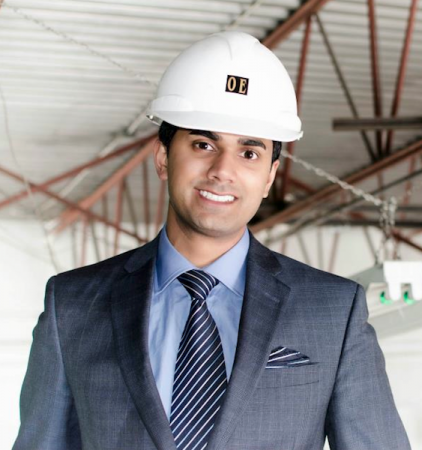
Organo Group expanding in liquid waste market
by Jennifer Matchett

Welcome to Cleantech Youth Profiles, a series of Q&A interviews with some of Student Energy’s most innovative clean technology entrepreneurs and researchers around the world.
Organo Group Ltd. is a Calgary-based liquid waste handling company serving Canada’s biofuels market. Founder and CEO Zakir Hussein also majors in environmental sciences and strategic management at Harvard University.
Give us the elevator pitch on your work
At the Organo Group, our core downstream business division has become one of Alberta’s largest restaurant and commercial liquid-waste handling companies. We procure and refine mainly waste oils such as animal fats and grease for the biofuel sector of Canada. Our foundations have been built on the triple bottom line approach of economical, social and environmental well-being for our community and our customers.
Tell us about the spark or initial “aha” moment that led to you pursuing this work?
I was at a career fair with a few classmates during my tenure at the University of Calgary. I saw all my friends and fellow students handing out resumes and trying to sell themselves for their next summer internship or first job. I said to myself, “that’s cool, but it’s not me.” I wanted to create something and share it with a team that strongly believes in creating jobs, protecting our environment and supporting the local communities where we do business.
What have been the biggest challenges for you to date?
One of the greatest challenges any business faces, including mine, is sustainable expansion that doesn’t strain the bottom line.
How is your university involved in your work in the clean technology industry?
My university has contributed about 75 percent of my venture business. My mentors—professors, faculty advisors, and the ideas generated from the community of students—have been instrumental in reducing risk.
What sources of funding have you attained so far? What’s next on the funding and revenue front?
The next big source of funding for Organo will come from private equity or venture capitalists interested in cleantech, and specifically, this industry. I need partners that will help grow the company.
Compare Canada to other jurisdictions on the Cleantech front (i.e. legal, funding, community, culture etc.)
I think we’re growing every day in terms of understanding what cleantech is and what benefits it has in store for Canada and the global market. In 2010, the global cleantech market reached an estimated $1 trillion—at a predicted 11 percent compound annual growth rate (CAGR). That number will be $3 trillion in 2020. The cleantech industry in Canada grew at 19 percent CAGR from 2008 to 2010, outpacing global market growth rates. It’s phenomenal to be part of an industry that’s driving a new sector of employment in Canada. There are approximately 700 technology SMEs across Canada with an estimated 44,000 direct jobs and employment growing steadily at 8 percent CAGR.
What is one thing you would change in Canada to further spur the cleantech industry?
Canada is fortunately flush with energy resources—renewable and non-renewable. This country makes the ‘top five energy producing nations” list. This means Canada produces nearly two percent of global greenhouse gas (GHG) emissions. The challenge we face as a nation is trying to figure out how we can balance our role in meeting global demand for energy with reducing our GHG emissions. In 2011, total known oil reserves in Alberta reached 170.2 billion barrels, which is 11 percent of total reserves. These figures imply that untapped natural gas reserves, and coal beds will require clean technologies to decrease the GHG emissions associated with their extraction.
Where do you see yourself in 10 years?
In 10 years I hope to be western Canada’s largest restaurant and commercial liquid-waste procurement and refining company that adapts to new changes and stays at the forefront of sustainability.
What advice would you give to other students researching or working in clean tech?
For researchers and students interested in cleantech, I believe our dreams have to be bigger, our ambitions higher, our commitments deeper, and our efforts greater. Stay true to yourself and make sure perseverance is embedded in your foundation. Face adversity and convert your goals into opportunity. Challenge all negative forces. I know ordinary individuals can achieve extraordinary things in a promising nation like Canada.
To learn more about Student Energy visit www.studentenergysummits.com
